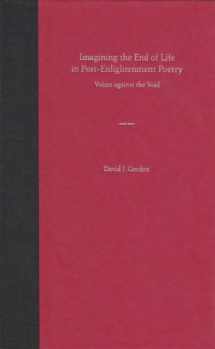
Imagining the End of Life in Post-Enlightenment Poetry: Voices against the Void
ISBN-13:
9780813028651
ISBN-10:
0813028655
Edition:
First Edition
Author:
David J Gordon
Publication date:
2005
Publisher:
University Press of Florida
Format:
Hardcover
192 pages
FREE US shipping
Book details
ISBN-13:
9780813028651
ISBN-10:
0813028655
Edition:
First Edition
Author:
David J Gordon
Publication date:
2005
Publisher:
University Press of Florida
Format:
Hardcover
192 pages
Summary
Imagining the End of Life in Post-Enlightenment Poetry: Voices against the Void (ISBN-13: 9780813028651 and ISBN-10: 0813028655), written by authors
David J Gordon, was published by University Press of Florida in 2005.
With an overall rating of 3.9 stars, it's a notable title among other
books. You can easily purchase or rent Imagining the End of Life in Post-Enlightenment Poetry: Voices against the Void (Hardcover) from BooksRun,
along with many other new and used
books
and textbooks.
And, if you're looking to sell your copy, our current buyback offer is $0.44.
Description
David Gordon studies the changing conception of one's own death by examining the work of some of the most important poets of the last two centuries. The turn from Enlightenment to Romanticism introduced a new conception of individual death that we would now call existential. As the power of religion waned and with it the consoling belief in an afterlife, writers--especially poets--began to think of death as nothingness, as void. Gordon identifies and analyzes in depth three major modes of literary response to this shifting sensibility that developed in successive waves during the nineteenth and twentieth centuries: opposing the void in bold confrontation, modifying the void by recasting some element of Christian tradition, and ultimately turning away from the afterlife as no longer meaningful to focus instead--with a subtler kind of consolation--on the difficult-to-imagine cessation of consciousness. Marginalizing writers with decided stances such as Swinburne and at the opposite extreme Hopkins, Gordon highlights writers in whom the interaction of religious and secular pressures is most apparent. Drawing upon Wittgenstein, Freud, and Burke for his theoretical orientation, Gordon provides close readings of a score of poets from Wordsworth, Byron, Tennyson, and Dickinson through Yeats, Lawrence, and Stevens to Bishop, Larkin, and Graham. In the process he distinguishes between the familiar form of elegy and his own subject, a more circumscribed, self-reflective poem, and creates telling comparisons and connections across several centuries and cultures. Comprehensive in scope and acute in its readings, Gordon's study will appeal to critics of nineteenth- and twentieth-century poetry as well as to intellectual historians.


We would LOVE it if you could help us and other readers by reviewing the book
Book review

Congratulations! We have received your book review.
{user}
{createdAt}
by {truncated_author}


